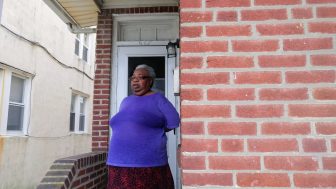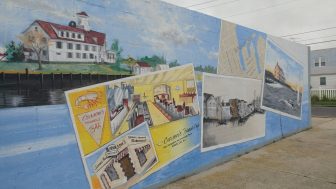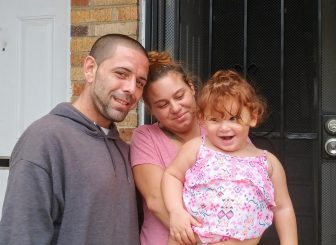From the steps of Patricia Harper’s Bungalow Park duplex you can look across the street through the gap in the houses and count three former casinos—the Revel, the Showboat, the Trump Taj Mahal—that were worth, not so long ago, well over $3 billion in total. Turn around and you’d see the Borgata, the most expensive hotel sold in the United States last year. But those glitzy properties can seem as remote and abstract as the properties on the Monopoly board.
 The neighborhood—a small peninsula three blocks wide, eight deep—is bordered to one side by Gardner’s Basin, a popular tourist site that’s the subject of a controversial redevelopment plan. To the northwest is Back Maryland, scene of some of the city’s worst gang violence in recent years. Like everywhere in Atlantic City, there are blocks marred by abandoned houses marked by shattered windows and overgrown weeds. There are also half-a-million-dollar mansions with bay views and modest bungalows owned by middle-class African Americans. There are recent immigrants and born-and-raised old-timers, people like Harper who worked or still work in the city’s remaining casinos.
The neighborhood—a small peninsula three blocks wide, eight deep—is bordered to one side by Gardner’s Basin, a popular tourist site that’s the subject of a controversial redevelopment plan. To the northwest is Back Maryland, scene of some of the city’s worst gang violence in recent years. Like everywhere in Atlantic City, there are blocks marred by abandoned houses marked by shattered windows and overgrown weeds. There are also half-a-million-dollar mansions with bay views and modest bungalows owned by middle-class African Americans. There are recent immigrants and born-and-raised old-timers, people like Harper who worked or still work in the city’s remaining casinos.
They talk about the drug epidemic—drug sellers and drug users—and the shooting and killing that accompany it. But there are less dramatic risks. The nearest ACME is three miles away in Ventnor. The ShopRite is miles offshore. The neighborhood is a food desert ringed by celebrity chefs. You can bet the cost of your house at the baccarat tables, but good luck finding a fresh tomato. And Superstorm Sandy’s marks are still evident. Almost everywhere, people cope with streets that flood on a regular basis.

From her front steps, Harper looked on a street whipped by the remnants of Hurricane Jose and talked about the young people living on the edge. If Atlantic City’s a place people come and get stuck, Bungalow Park can be one of the places they get stuck in. Healthcare and social services are the second biggest employers (after entertainment), accounting for up to one in five jobs for workers living in the neighborhood, according to 2015 census estimates. (The estimates are for Census Tract 14, an area that covers Bungalow Park along with a few additional blocks to the west that include Back Maryland).
“They think they can strike it rich in these casinos, which you don’t. That’s why it’s called gambling. They come here and they just get into a situation and they never leave,” she said. “You have too many young homeless people here.”
At best, residents we spoke with for the Voting Block project were ambivalent about the governor’s race and said they had not heard much about either candidate’s campaign. When asked about issues that mattered to them, however, they were full of ideas and concerns.
For the first time in 12 years, New Jersey is choosing a governor without an incumbent in the race. It’s a critical moment for the future of the state, and it comes at a time when conversations across the political divide are becoming increasingly difficult. Voting Block is a New Jersey collaborative reporting effort to explore the gubernatorial election through different neighborhoods around the state. Find more reporting from the series here. Route 40 will be talking with residents in the Bungalow Park neighborhood in the run up to the Nov. 7 election to hear their views on the issues that matter to them.
 Around the corner from Harper was a rowhouse where Robert Mergel and his girlfriend had recently moved with county assistance. Mergel, originally from Ocean County, and Nicole Rotelli, from an Atlantic City suburb, said they were also shocked by the homelessness and drug use even in the parks and at the city library. “In other neighborhoods, you’re not allowed to be homeless,” Mergel said. “The cops lock you up, they’ll arrest you. Here there are people passed out on the benches, on the side of the road,” he said, shaking his head. His girlfriend, Nicole Rotelli, said she would like to go back to work but noted that the $200 cost of a casino license, with no guarantee of a job, is expensive.
Around the corner from Harper was a rowhouse where Robert Mergel and his girlfriend had recently moved with county assistance. Mergel, originally from Ocean County, and Nicole Rotelli, from an Atlantic City suburb, said they were also shocked by the homelessness and drug use even in the parks and at the city library. “In other neighborhoods, you’re not allowed to be homeless,” Mergel said. “The cops lock you up, they’ll arrest you. Here there are people passed out on the benches, on the side of the road,” he said, shaking his head. His girlfriend, Nicole Rotelli, said she would like to go back to work but noted that the $200 cost of a casino license, with no guarantee of a job, is expensive.
 After Sandy, some residents left and did not return. People we spoke with were indirectly affected by flooding that blocks nearby streets often after heavy rain. A couple of residents were aware of city efforts to improve drainage and restore bulkheads, but none knew if the governor candidates had plans to improve coastal resiliency. Harper, who was born in Atlantic City, seemed resigned. “The flooding – we’re right here in the middle of the Atlantic Ocean, so the water don’t have nowhere else to go but come inland…There’s not too much you can do about that… The water still going to come in…Whatever they do, it is what it is,” she said.
After Sandy, some residents left and did not return. People we spoke with were indirectly affected by flooding that blocks nearby streets often after heavy rain. A couple of residents were aware of city efforts to improve drainage and restore bulkheads, but none knew if the governor candidates had plans to improve coastal resiliency. Harper, who was born in Atlantic City, seemed resigned. “The flooding – we’re right here in the middle of the Atlantic Ocean, so the water don’t have nowhere else to go but come inland…There’s not too much you can do about that… The water still going to come in…Whatever they do, it is what it is,” she said.
Like many urban neighborhoods in New Jersey, there is a high rate of unemployment and poverty. Almost half of the population of the census tract lives at or below the poverty level. And although it is not as diverse as other Atlantic City neighborhoods, one in four households speaks a language other than English at home, according to the census estimates. One in five residents is foreign-born, with immigrants mostly hailing from either Africa or Latin America, along with a handful from Asia. Most arrived here before 2010. As jobs have vanished with casino closures, so have more recent immigrants.
A corner store, staffed by non-local employees, and a construction-supplies store are pretty much the limit of ‘mixed-use’ development in the close-knit community. Several residents said a supermarket somewhere in Atlantic City would improve their quality of life.
“With all these empty lots right here in Atlantic City, they could build a grocery store,” said Tina Hamlett. “And a movie theater for the children.”
Hamlett, a cafeteria worker, asked not to be photographed.
Atlantic City residents will also vote for mayor in November and Harper seemed tired in general of a political process that she said seems to involve more “finger pointing” than trying to help people who need help. Asked about what she would like to see from the candidates for governor, she said lower- and middle-class people need more attention. “You have to put the residents first,” she said. “Take a look at everything that’s going on around you… Try to do something to bring down crime – crime’s all over, it’s not just in this city.”
This story is part of the Voting Block series and was produced in collaboration with The Record, NJ Spotlight, WHYY, WNYC, Reveal from The Center for Investigative Reporting, the Center for Cooperative Media and New America Media. To read all the stories in this series, visit VotingBlockNJ.com.